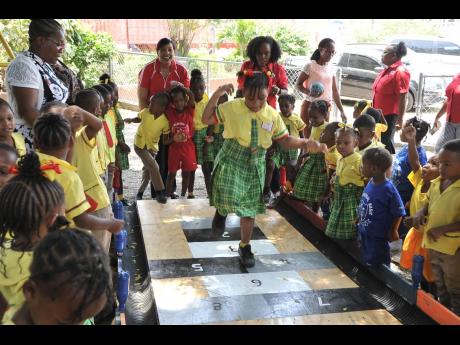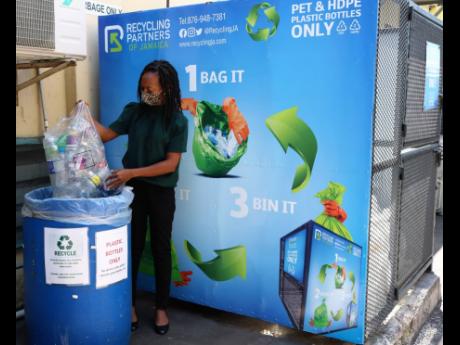Salada touting exports, innovation to boost top line

Products from the Jamaica Mountain Peak line, produced by coffee company Salada Foods Jamaica Limited, are now on the shelves of major US retailer Publix Supermarkets in Florida, specifically in the Miami and Jacksonville areas. It will give Floridians a taste of Salada’s flavoured coffees such as Coconut Cappuccino, as well as non-coffee products such as its ginger teas. General Manager Tamii Brown says the foray into the southern United States is part of a larger export drive that’s meant to improve Salada’s revenues. It is also an expansion of Salada’s North American markets, which already include the Tri-State area of the US and Canada. Brown says the company is pushing for improvements on all fronts, with a particular focus on exports. The company is also aiming to drive up sales through product innovations. In the December quarter, revenue improved by two per cent to just under $300 million. In nominal terms, the gain was less than $6 million. And Brown says the company is looking towards the Caribbean and the diaspora to move the needle. “We’re focusing on our neighbourhood, first and foremost, that is to say, our Caricom footprint. We had our first shipment to St Lucia and Antigua, and they’ve just released our first shipment to Trinidad,” she said. Salada promised shareholders last April that the company would be pushing innovation. One new product has undergone extensive testing and should be ready for launch before the annual shareholders’ meeting set for March 20. “It has the highest sensory evaluation ratings that we’ve got in a few years. We’re very excited about it,” Brown said, as she teased about the new offering. “It’s a non-coffee product which is in line with our stated goal of product diversification. It is a Jamaican product using Jamaican inputs, but it’s not coffee,” the GM said. Despite the flat top line in the December first quarter, Salada delivered 12.8 per cent more in net profits relative to the previous year. The company earned $30.88 million, up from $27.37 million.
GoodHeart | Jebb Memorial receives eco-bowling alley from Salada Foods and ESIROM

Corporate partners Salada Foods and ESIROM Limited boosted the playtime and extra-curricular activities at Jebb Memorial Basic School located on Spanish Town Road with the donation of an eco-friendly bowling alley. School Principal, Leonie Salmon Wong-Sue said that the students and teachers welcome the eco-friendly bowling alley and were anxious to get the games on a roll. “From Monday, the children were peeping through the window curious to see what the main structure was. I don’t think many of our children (who are from the community) are exposed to playing outdoors, especially traditional games, when they are home. Now we have the bowling alley and a hopscotch too. They were initially happy coming outside to have a look at it and more so to play the games,” she said. Made from recycled materials, primarily plastic bottles for the bowling pins, an old pipe ‘up-cycled’ to make the gutter and ply board forming the land and the overall structure, the bowling alley was a large structure, adjusted to fit into the play area at the school. Salada Foods has been working with administrators at Jebb Memorial Basic School to improve infrastructure and welfare at the institution. The early childhood institution currently has 69 children enrolled and four teachers, inclusive of the principal, who also teaches. “The partnership with Salada goes way back, before I even arrived here in 1999, and since then they have done so much. They love the students very much and want to see the school up and the doors open so we can continue to have the little ones come in so we can educate them. Everyone loves the gift, it was a creative way to get their attention and get them listening and the token shows Salada was also listening. I know the children will be asking often when they can go out to bowl and this is also a medium for us to teach colours and help them with their fine and gross motor skills, through an experience they will love,” Wong-Sue stated. The bowling alley was originally constructed by Denzel ‘Trevor’ Edwards, a fisherman by profession, who is passionate about environmental sustainability and plastic waste management, for ESIROM’s 2023 Earth Hour Concert which was held in March. Salada was delighted to know that the team was able to find a way to repurpose the bowling alley, and according to Tamii Brown, Salada Foods’ general manager, the changes were appropriate and fulfilled the desired outcome of making the bowling alley “an edutainment tool”. “It was heartwarming to see how excited the children were to receive the bowling alley, and having visitors to share with them on the occasion. Children need these types of engagements in order to function and to enhance their learning capacities and all the better, that it can be done in the eco-friendly space that Salada Foods and our friends at ESIROM have partnered to create. Repurposing the alley was ingenious; and we wanted to build on immersive learning activities with a game such as bowling, that requires critical thinking, collaboration, creativity and communication amongst the children, all while empowering their educators,” said Brown. In her efforts to find sustainable projects and ways to educate the youths on their responsibility to the environment, Khalia Hall, sustainability coordinator at ESIROM Limited, discovered that games could not only attract the needed attention at the concert, but help to raise awareness. “In trying to host the event more sustainably, one of the things we included was the ‘Planet Play’ section and we were happy to have Salada on board to sponsor one of the games. After we saw the impact it made, we never wanted it to go to waste and they told us about Jebb Memorial Basic School and we thought it was a perfect solution to the situation,” Hall said. She continued, “Something I always say is, a big solution to environmental issues is to raise awareness and to educate; and thinking back to when I was a student in school, I never learnt about it. Now, they’re learning it from a young age and to have a symbolic game that is not only fun but entertaining and educational, they see something like plastic bottles being put to use rather than thrown in the trash. My heart was also warmed from setup to finish, I was expecting the excitement but never expected it to this level, I’m at a loss for words.”
Salada working to reduce carbon footprint….one plastic bottle at a time

Known as a roasted coffee company for more than 60 years, Salada Foods Jamaica Limited is moving to reduce its carbon footprint and in the process achieve a bonus of overall improved efficiencies in its operations. The company recently joined the Recycles Partners of Jamaica (RPJ) network of businesses which collect plastic bottles made from polyethylene terephthalate (PET) and high-density polyethylene (HDPE), both of which are derived from petroleum and whose appeal for manufacturers lies in the fact that they can easily be shaped into bottles and containers for packaging foods and beverages, personal-care products, and many other consumer products. When The Gleaner team visited the factory at 20 Bell Road, off Spanish Town Road, Kingston, General Manager Tamii Brown and Quality Assurance Manager Nadine Francis were excited to share the progress Salada has made since getting involved just about two months ago. In addition to a metal cage for storing the bottles, the company also has 55-gallon capacity drums at strategic locations, such as the entrance to the canteen. “Our focus this year has just been on efficiency, in how can me do things better, including in our plant. How do we address the issue of waste management, how can we be a little cleaner with our approach?” Brown asked. “It’s making sure that as a corporate entity when we look behind, that footprint is something that we can be proud about.” Francis had for years been looking for a way to reduce the negative impact of the many plastic bottles she saw in her work environment, given the potential for pollution when they got out into the solid waste stream. “We do use a lot of bottles because we have a canteen and we were just putting the bottles in any bin, throwing them away and the thought came to me that there must be a more-structured approach to the collection and disposal of this product which becomes an environmental hazard once it is discarded,” she told The Gleaner. Francis contacted RPJ after seeing one of their television advertisements and was pleasantly surprised to find that they would provide the cage, on condition that Salada would do the maintenance for it. Once the cage is almost 75 per cent filled, Salada advises RPJ, and a pick-up follows within 5-7 days, by which time it is nearing capacity. The initiative has caught on so well that workers are encouraged to bring their drink bottles from home, but things weren’t always so smooth in the beginning, according to Francis. “At first, it was a bit challenging to get everybody to remember to put the bottles in a specific bin. Some persons were also depositing other materials in it,” he said. So to reinforce the message, notices were placed beside the bins reminding staff of their purpose. This is part of much bigger plan to get Salada on to a path of sustainable environmental activism and practices, Brown pointed out. “We are trying to be more action-oriented and one of our major initiatives in terms of our plant and production is waste management. Just doing cleaner manufacturing, reducing our waste, be better stewards of our resources. We are moving to engender a kind of culture among our staff to get the necessary support in terms of our corporate social responsibility. “We have to make sure that whatever talk we [are] talking, we [are] walking it as well,” Brown added. She and the rest of the management team are convinced that with enough corporate buy-in, initiatives like the one at Bell Road will redound to the national good. “Once you show people the connection between what they do and the likely impact on the food chain, this usually evokes a commitment to change.”